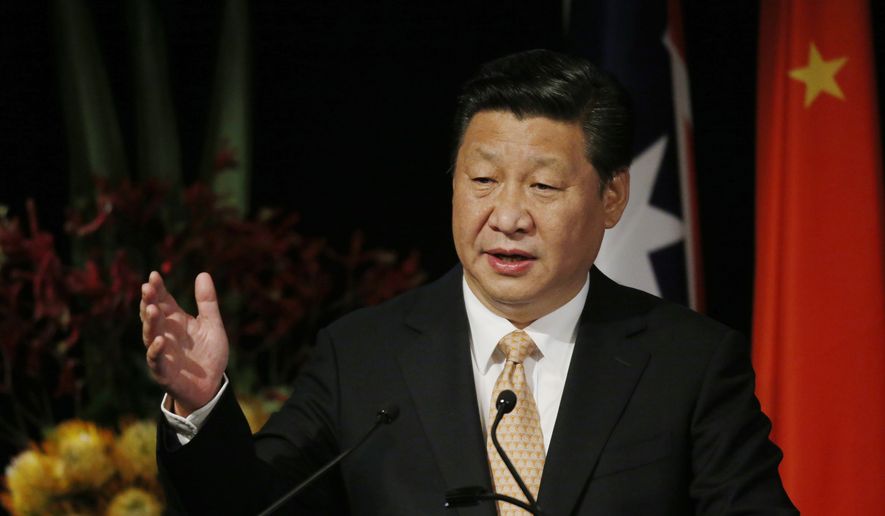MILITARY GRAFT AND SUICIDE
As Supreme Leader Xi Jinping’s anti-graft crusade penetrates the inner circles of the People’s Liberation Army, signs of internal tension and disorder among senior military leaders are becoming evident, with reliable sources reporting that a growing number of leaders have committed suicide.
On Nov. 13, Vice Admiral Ma Faxiang jumped to his demise from a 15th floor window in the PLA Navy’s Beijing headquarters.
Days earlier, Maj. Gen. Song Yuwen, deputy commissar of Jilin military district, reportedly hanged himself. He was among eight flag officers who recently had been arrested on corruption charges.
On Sept. 2, Rear Admiral Jiang Zhonghua jumped to his death from a high-rise building on a naval base in Zhejiang province.
The PLA is the world’s largest armed force and has been a pillar of the communist government. Its members enjoy enormous privileges, wealth and political clout, which has bred corruption and immunity from punishment. No communist leader in the past several decades had been able to stem military corruption until Mr. Xi last year began to go after top leaders.
According to sources from China, more than 200 senior PLA officers are under investigation for corruption, and many are suspected of being members of a massive graft ring led by Gen. Xu Caihou, the highest uniformed officer between 2004 and 2012. Gen. Xu served as vice chairman of the Chinese Communist Party’s Central Military Commission, the nation’s highest military command authority. Many of these officers are under great stress, which is believed to be the primary reason for the suicides.
Apparently, the purge on corruption is not going to stop at Gen. Xu.
On Thursday, Gen. Liu Yazhou, commissar of the Chinese National Defense University and a mouthpiece for Mr. Xi, issued a stern warning via the PLA Daily newspaper. He stated that “our investigation and punishment of corrupt elements such as Xu Caihou and Gu Junshan are only the beginning of our military’s anti-corruption battle of annihilation and protracted war.” The comments strongly hinted at the next target: Gen. Guo Boxiong, the other former vice chairman of the Central Military Commission.
Before his suicide, Adm. Ma had been deputy commissar in charge of officers’ promotions and ideological indoctrination; Adm. Jiang had been director of naval armaments for the South Sea Fleet. Both were believed to have been implicated in a corruption ring led by Gen. Xu, and now possibly by Gen. Guo as well.
Gen. Xu is said to have practiced nepotism and promoted a large number of senior officers based upon the size of the bribe offered him by officer aspirants. He was officially charged with crimes and is facing China’s version of military justice.
TOO FEW TAIWAN RECRUITS
Affluent, democratic Taiwan is facing increasing security threats, yet few young people are willing to join the military to defend their island nation.
Decades of economic prosperity and democratic lifestyle have prompted Taiwanese politicians to try to abandon the unpopular compulsory military service required of all able-bodied males. In 2009 the government announced it would end the compulsory system by the end of 2014 and replace it with an all-voluntary system.
With the deadline fast approaching, Taiwan is ensnarled in a heated debate about the change.
A key issue is the shrinking number of volunteers, as today’s young people are busy pursuing careers in the booming private sector.
Taiwan’s Legislative Yuan, or parliament, is flush with ideas on how to attract recruits. One recently proposed idea calls for Taiwan to recruit the offspring of former Chinese Nationalist servicemen who have migrated to Southeast Asian countries such as Thailand, Myanmar, Cambodia and Laos. Many of these youths have grown up in anti-communist families and are devoted to their ancestral homeland of Taiwan.
A bizarre proposal was introduced last week by lawmaker Zhou Ni-an, who suggested that Taiwan consider recruiting mercenaries from African countries.
In all likelihood, the 2014 deadline for implementing an all-voluntary service will be postponed until 2016. But the debate on the recruit shortage rages on.
• Miles Yu’s column appears Fridays. He can be reached at mmilesyu@gmail.com and on Twitter @Yu_Miles.
• Miles Yu can be reached at yu123@washingtontimes.com.




Please read our comment policy before commenting.